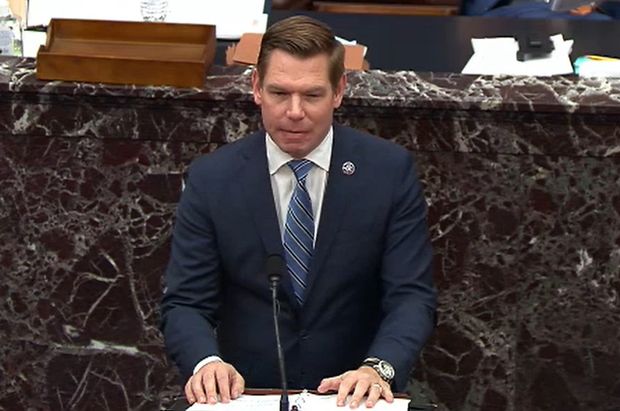
Rep. Eric Swalwell speaking on the Senate floor during Day 2 of former President Donald Trump’s second impeachment trial: Google images
By Glynn Wilson –
House impeachment manager Eric Swalwell, a Democrat in Congress from California, filed a lawsuit in federal court on Friday against former President Donald Trump for his role in inciting the Capitol insurrection on January 6 to delay certifying Joe Biden as president.
Attempting to move the impeachment case made by the House — which failed to result in a conviction in the Senate — into the justice system, the lawsuit accuses Trump and key allies of inciting the deadly attack and conspiring to attempt stopping Congress from certifying the Electoral College votes for Biden.
Like the case laid out in the Senate trial, it meticulously traces a months-long campaign by Trump to undermine confidence in the 2020 election and then overturn its results.
“The horrific events of January 6 were a direct and foreseeable consequence of the defendants’ unlawful actions,” Swalwell says in the lawsuit, filed in Federal District Court in Washington, D.C.. “As such, the defendants are responsible for the injury and destruction that followed.”
Swalwell asks the court to declare that Trump violated federal civil rights law and terrorism and bias crime statutes in the District of Columbia and inflicted serious emotional distress, “findings that could severely tarnish (Trump’s) legacy and political standing,” according to The New York Times.
The congressman is seeking unspecified compensatory and punitive damages, and the case could result in an open-ended discovery process if the case is allowed to go forward in court that could turn up information about Trump’s conduct and communications that eluded impeachment prosecutors.
The suit also names as defendants Trump’s son Donald Trump Jr., his lawyer Rudolph W. Giuliani and Republican Alabama Congressman Mo Brooks, who helped lead the effort to overturn Trump’s election defeat when Congress met on Jan. 6 to formalize the results. All three men joined Trump in promoting and speaking at a “Stop the Steal” rally on the National Mall that day that Swalwell says lit the match for the violence that followed.
A majority of the Senate, including seven Republicans, voted to find Trump “guilty” based on the same factual record last month, and even Republicans who voted to acquit him, like Senator Mitch McConnell of Kentucky, concluded that Trump was culpable for the insurrection. Many Republicans argued that the Senate simply lacked jurisdiction to punish a president no longer in office, and said the courts were the proper venue for those seeking to hold him accountable.
Philip Andonian, a lawyer representing the congressman, said that the lawsuit was an answer to that call.
“The fact that he seems to be made of Teflon cuts in favor of finding a way to pierce that because he hasn’t really been held fully accountable for what was one of the darkest moments in American history,” he said in an interview with The Times.
The lawsuit adds to Trump’s mounting legal woes. Prosecutors in New York have active investigations into his financial dealings, and in Georgia prosecutors are investigating his attempts to pressure election officials to reverse his loss.
Related: Donald Trump, the Criminal President, Does it Again in Phone Call to Georgia
Another Democratic congressman, Bennie Thompson of Mississippi, has already filed suit on similar grounds in recent weeks with the N.A.A.C.P.
Both Thompson’s suit and Swalwell’s rely on civil rights law tracing to the 19th century Ku Klux Klan Act, but the aims appear different. The earlier suit targets Trump’s association with right-wing extremist groups, naming several groups as defendants and explicitly detailing racist hate it claims figured in the attack. Swalwell focuses more narrowly on the alleged scheme by Trump and his inner circle.
During the Senate trial, Trump’s defense lawyers flatly denied that he was responsible for the assault and made broad assertions that he was protected by the First Amendment when he urged supporters gathered on Jan. 6 to “fight like hell” to “stop the steal” underway at the Capitol.
The nine House managers argued that free speech rights had no place in a court of impeachment, but they may prove a more durable defense in a court of law. Though the suit targets them in their personal capacities, Trump may also try to dismiss the case by arguing that the statements he made around the rally were official, legally protected acts.













